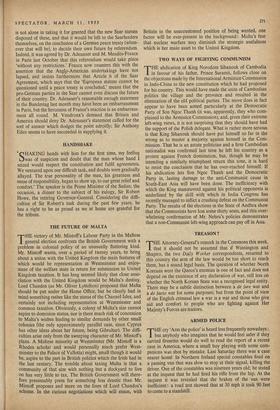THE FUTURE OF MALTA
THE victory of Mr. Mintoff's Labour Party in the Maltese general election confronts the British Government with a problem in colonial policy of an unusually flattering kind. Mr. Mintoff wants, over a period of twenty years, to bring about a union with the United Kingdom the main features of which would be representation at Westminster and enjoy- ment of the welfare state in return for submission to United Kingdom taxation. It has long seemed likely that close asso- ciation with the United Kingdom would be Malta's destiny. Lord Chandos (as Mr. Oliver Lyttelton) proposed that Malta should be put under the Home Office, but he clearly had in mind something rather like the status of the Channel Isles, and certainly not including representation at Westminster and common taxation. Obviously, a colony of Malta's size cannot aspire to dominion status, nor is there much risk of concession to Malta's wishes leading to similar demands by other small colonies (the only approximately parallel case, since Cyprus has other ideas about her future, being Gibraltar). The diffi- culties arise only from the sweeping character of Mr. Mintoff's plans. A Maltese minority at Westminster (Mr. Mintoff is a Rhodes scholar and would personally much prefer West- minster to the Palace of Valletta) might, small though it would be, aspire to the part in British politics which the Irish had in the last century. The trouble about taxing Malta is that a community of that size with nothing but a dockyard to live on has very little to tax. The British Government will there- fore presumably press for something less drastic than Mr. Mintoff proposes and more on the lines of Lord Chandos's scheme. In the curious negotiations which will ensue, with Britain in the unaccustomed position of being wanted, one factor will be ever-present in the background : Malta's fear that nuclear warfare may diminish the strategic usefulness which is her main asset to the United Kingdom.










































 Previous page
Previous page